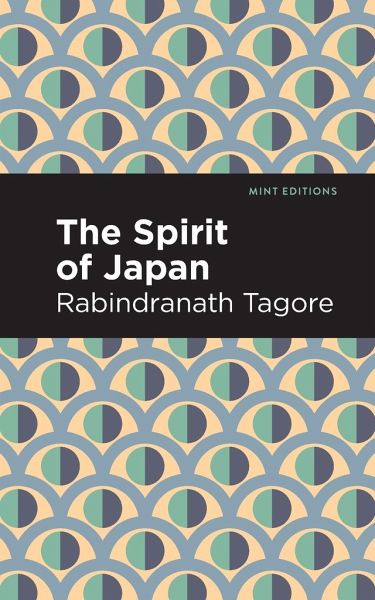
The Spirit of Japan
Versandkostenfrei!
Versandfertig in 1-2 Wochen
6,49 €
inkl. MwSt.
Weitere Ausgaben:

PAYBACK Punkte
3 °P sammeln!
The Spirit of Japan (1916) is a speech by Rabindranath Tagore. Published after he received the 1913 Nobel Prize in Literature, The Spirit of Japan is a powerful lecture on Japanese culture in relation to the modernizing forces of the West. Delivered at the Keio Gijuku University in Tokyo, The Spirit of Japan is a testament to Tagore's gifts as an artist and intellectual. "True modernism is freedom of mind, not slavery of taste. It is independence of thought and action, not tutelage under European schoolmasters. It is science, but not its wrong application in life,-a mere imitation of our scien...
The Spirit of Japan (1916) is a speech by Rabindranath Tagore. Published after he received the 1913 Nobel Prize in Literature, The Spirit of Japan is a powerful lecture on Japanese culture in relation to the modernizing forces of the West. Delivered at the Keio Gijuku University in Tokyo, The Spirit of Japan is a testament to Tagore's gifts as an artist and intellectual. "True modernism is freedom of mind, not slavery of taste. It is independence of thought and action, not tutelage under European schoolmasters. It is science, but not its wrong application in life,-a mere imitation of our science teachers who reduce it into a superstition absurdly invoking its aid for all impossible purposes." Invigorated by a tour of Japan, Rabindranath Tagore reflects on a culture which, to his mind, has "realized nature's secrets, not by methods of analytical knowledge, but by sympathy." Before he returns to his native country, he makes sure to warn the gathering of Japanese students who have come to hear him speak of the dangers of modernization and the encroachment of European values. This edition of Rabindranath Tagore's The Spirit of Japan is a classic of Indian literature reimagined for modern readers. Since our inception in 2020, Mint Editions has kept sustainability and innovation at the forefront of our mission. Each and every Mint Edition title gets a fresh, professionally typeset manuscript and a dazzling new cover, all while maintaining the integrity of the original book. With thousands of titles in our collection, we aim to spotlight diverse public domain works to help them find modern audiences. Mint Editions celebrates a breadth of literary works, curated from both canonical and overlooked classics from writers around the globe.














